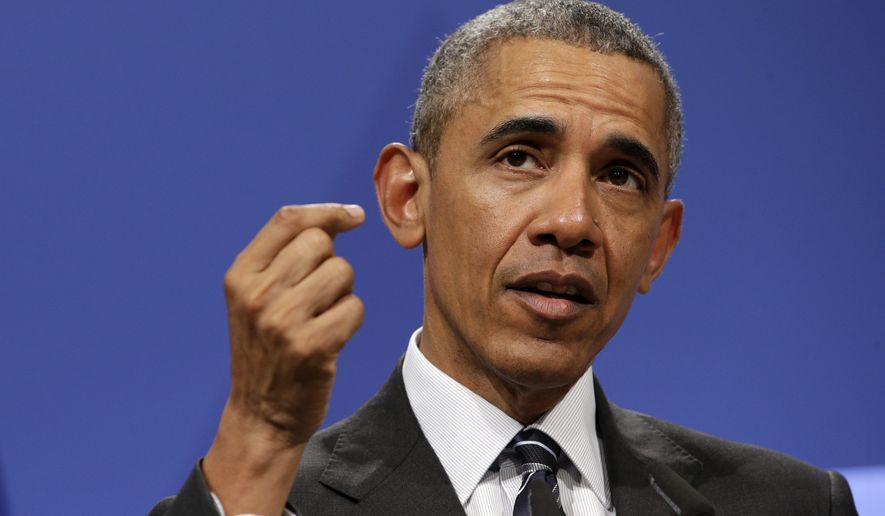The 97 percent of scientists frequently cited by President Obama who agree on climate change? Some of them are actually climate “deniers.”
Take David Legates, University of Delaware professor of climatology. He’s known as a leading “denier” for his skeptical take on the catastrophic climate change narrative, but he does agree that the climate is changing — which, by Mr. Obama’s standard, puts him in the 97 percent.
In fact, Mr. Legates says the figure is probably closer to 100 percent, because few reputable scientists would disagree that the climate changes, or even that humans have an impact on climate. Where he and other scientists part company with the “consensus” is on the narrower issues of whether human activity is the primary driver of global warming or whether it signals imminent climate disaster.
“Neither of these arguments have been proven, and they represent the extremes to which the ’believers’ will go to push their agenda,” said Mr. Legates in an email to The Washington Times. “These questions are seldom addressed by the ’believers’ when they are trying to manufacture their supposed ’consensus’ since they will not find widespread agreement.”
Those touting the 97 percent figure “ask simplistic, obvious questions for which nearly 100 percent consensus can be attained and then pretend that saying ’I believe in climate change’ actually means ’I believe anthropogenic global warming will be disastrous,’” he said.
The great 97 percent debate heated up again in the context of Friday’s signing of the Paris Agreement at the United Nations. In the nonbinding accord, signed by Secretary of State John F. Kerry, 175 nations agreed to work toward keeping the rise in global temperatures before 2100 “well below” 2 degrees Celsius compared to pre-industrial levels.
The December talks that laid the groundwork for the accord “marked the moment that we put to rest once and for all the debate over whether climate change is real — and began instead to galvanize our focus on how, as a global community, we are going to address the irrefutable reality that nature is changing at an increasingly rapid pace due to our own choices,” Mr. Kerry said.
Skeptics say the White House is trying to have it both ways by misrepresenting the 97 percent figure to counter opposition to the agreement.
For example, in an Organizing for Action email last week, Mr. Obama said 97 percent agree on the “basic science of climate change,” a broad, vague statement that could apply to a host of climate-related theories and would include any number of leading “deniers.”
“Ninety-seven percent of climate scientists agree on the basic science of climate change, and we’ve been hearing their warnings for years,” Mr. Obama said in the email. “But climate change deniers in Congress and at the state level have willfully rejected scientific analysis and ignored potential threats.”
In December Mr. Obama upped the ante by saying at a press conference that “99.5 of scientists and experts” agree with the “global consensus” that “this is really important,” according to CNSNews.com, a similarly vague pronouncement.
As skeptics increasingly challenge the 97 percent figure, which has its roots in a 2004 study by Harvard’s Naomi Oreskes, other researchers have come to its defense.
Most recently, a Michigan Technological University study published in the April edition of Environmental Research Letters “confirms that 97 percent of climate scientists agree that climate change is caused by humans,” according to an April 11 press release.
But a March survey by George Mason University of 4,092 American Meteorological Society members found that only 67 percent believed that climate change is mostly or entirely caused by humans.
“Fully 33 percent either believe climate change is not occurring, is mostly natural or is at most half-natural and half-man-made (I tend toward that last category) or simply think we ’don’t know,’” said Roy W. Spencer, climate scientist at the University of Alabama at Huntsville, who has been branded a “denier” by the climate change movement.
“For something that is supposed to be ’settled science,’ I find that rather remarkable,” Mr. Spencer said in a March 24 post on his Global Warming blog.
Three years ago Mr. Legates and his team created a stir by challenging a paper by John Cook, Global Change Institute research fellow, who had claimed to validate the 97 percent consensus with an examination of 11,944 scientific papers over a 21-year period.
The University of Delaware team examined the data and concluded that the consensus was actually closer to 0.3 percent — not 97 percent.
Why? “[A]ny paper which did not provide an explicit, quantified rejection of their supposed consensus was in agreement with the consensus,” Mr. Legates said in a post last week on the climate website Watts Up With That?
“In other words, the entire exercise was a clever sleight-of-hand trick,” Mr. Legates said. “What is the real figure? We may never know. Scientists who disagree with the supposed consensus — that climate change is man-made and dangerous — find themselves under constant attack.”
Mr. Legates was one of seven academics who came under investigation last year after Rep. Raul M. Grijalva, Arizona Democrat, sent letters to their universities asking for their funding sources. Supporters of the “Grijalva Seven” professors slammed the probe as a “witch hunt” designed to chill dissenting research.
The University of Delaware refused to cooperate with the investigation, citing its risks to academic freedom.
• Valerie Richardson can be reached at vrichardson@washingtontimes.com.




Please read our comment policy before commenting.